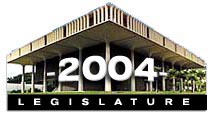
Tech, campaign spending
bills alive
State lawmakers have kept alive bills that would clamp down on campaign spending violations and impose a new fee for cellular telephone users to set up a system to locate them when they dial 911.
Another bill that would tighten the requirements to qualify for the state's controversial high-technology tax credit was among numerous bills positioned for final votes by legislators to meet yesterday's deadline.
However, a measure that would have conformed the state's wiretap laws with those of the federal government failed to win approval. Law enforcement agencies were pushing to change the state's more restrictive law in the war against crystal methamphetamine, or "ice."
Senate Bill 459, CD2, would prohibit contributions from companies that are awarded nonbid contracts higher than $25,000; restrict contributions from out-of-state corporations, unions and noncandidate committees; and raise campaign spending violations from misdemeanors to Class C felonies.
"We're reacting to a lot of the abuses that we've seen in the media and in the court cases," said Rep. Blake Oshiro (D, Halawa Valley-Aiea Heights).
Campaign Spending Commission Executive Director Bob Watada believes the measure is a good step in the right direction. He said campaign finance reform has to include cleaning up how contracts are awarded.
"You have to fix both sides," Watada said. "There's a real close relationship between the procurement process and campaign finances or contributions that are made that are in some way connected to the contract."
However, lawmakers failed to approve a measure that would have set up a public funding program for state House candidates who agree to abide by campaign spending contribution and expenditure limits.
Senate Bill 2396, CD1, would limit eligibility for the state's high-technology tax credit to companies certified as qualified high-technology businesses, and remove from existing law language that requires the state to apply the law "liberally."
The bill also would create a state private investment fund and extend the credit an additional five years.
The current law is scheduled to be repealed Dec. 31, 2005.
"I think the bill is really a step forward for economic diversification," said Rep. Brian Schatz (D, McCully-Tantalus), chairman of the House Economic Development and Business Concerns Committee.
State Tax Director Kurt Kawafuchi said removal of language that required the law to be "liberally construed" will discourage businesses from trying to take advantage of the law and make enforcement easier.
Gov. Linda Lingle's administration estimates the changes to the law will save the state $65.4 million during the next two years. In 2001 and 2002, the first two years the credit was available, the state paid back $59 million.
Lawmakers failed to approve a measure that would have increased the incentives for television and movie productions.
House Bill 2883, CD1, would impose a 66-cent monthly surcharge for each commercial mobile radio service connection beginning July 1.
The money would be used to establish and support a statewide enhanced wireless 911 system that will allow operators to determine the caller's identification and location.
Enhanced 911 systems have proved to be a lifesaving service in parts of the country that have established them. Calls to 911 operators from mobile telephones are routed to police, fire, ambulance or other emergency services.
